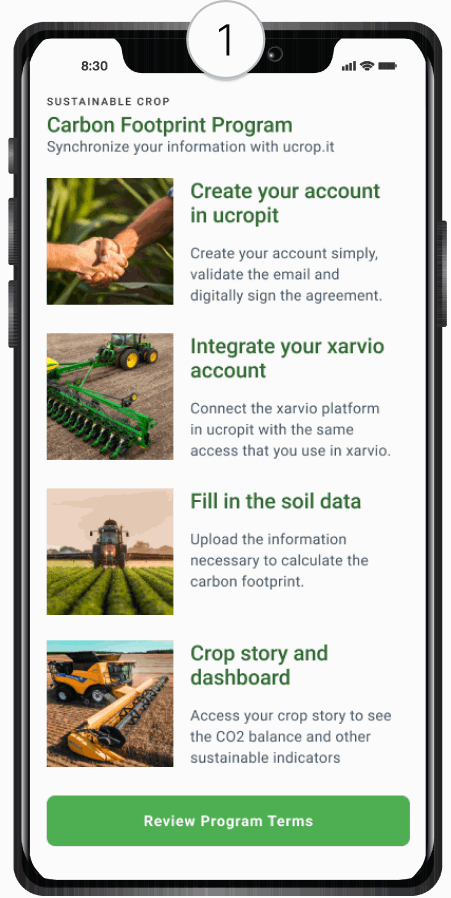- Ag breakdowns
- Posts
- Ucrop.it
Ucrop.it
The Blockchain for Farmers

Good Morning! It’s Sunday, April 13th, and because farmers deserve better than "trust me, bro" for proof, this week’s company is using blockchain technology to verify agricultural sustainability.

As always, if you have any feedback to improve the newsletter, just hit reply - I’d love to hear from you!
First time reading? Sign up here
Don’t keep us a secret! Share this email with friends(copy URL here)
Ag Breakdowns covers the companies revolutionizing the agriculture value chain. If that’s you, apply here
THE BIG PICTURE
As sustainability becomes the currency of modern farming, blockchain technology is trying to reshape how we manage everything from crops to the final product.
Some challenges farmers face
Tech barriers: Many smallholder farmers struggle with digital tools, creating an inequality in blockchain adoption.
Complex regulations: Different rules in each country make it hard for farms to prove their sustainability efforts.
Old systems: Outdated infrastructure and disconnected data systems prevent the full benefits of blockchain.
Instead of spending hours verifying sustainability claims, farmers could be innovating in their fields. Blockchain is where they can save time and increase value.
Market outlook
The global blockchain in agriculture and food supply chain sector was valued at $302.8M in 2023 and it’s expected to hit $4.6 billion by 2032, growing at 36% annually. (Source)
Other players in the space
Looking ahead
Tech convergence: Sensors and AI are teaming up with blockchain to provide deeper insights into sustainability.
Big partnerships: Ucrop.it's NASA partnership shows how scalable these solutions can be.
Consumer demand: As people ask for more transparency, blockchain verification is becoming a must in agriculture.
THE BUSINESS
Ucrop.it is leading the way in using blockchain to verify sustainable farming practices. They are also helping farmers get paid fairly for their efforts.
They combine blockchain records, NASA satellite data, and their own verification tools to track and prove sustainable farming practices. This gives farmers a way to show their impact clearly and consistently.
Their platform helps farmers get better deals, companies meet sustainability rules, and supply chains build trust with consumers.
Business Breakdown
Industry: Agricultural fintech / Blockchain traceability
Headquarters: Vicente López, Buenos Aires, Argentina
Year funded: 2018
Funding: 9.4M in total funding (Pitchbook)
Investors: GLOCAL (Argentina), MANA Tech, Thrive by SVG Ventures, Google for Startups.
Business model: Ucrop.it offers free access to farmers while charging corporations subscription fees for verified sustainability data. Farmers retain ownership of their data but can monetize it through the platform's negotiation tools to access premium markets.
Traction: Operating in 9 countries | Analyzing over 7 million hectares (17.3 million acres) of agricultural land | Serving 80+ corporate clients including major agribusiness companies | Strategic partnership with NASA Harvest Alliance for satellite data integration.
Website: Ucrop.it
Socials: LinkedIn
Founder Profile
Diego Hoter (CEO), brings over two decades of agribusiness experience to the table. After eight years steering Monsanto's soybean business, Hoter identified the critical "trust gap" plaguing sustainability claims.
Marcos Botta (COO), an agronomist with specialized postgraduate education in agribusiness. Botta's previous leadership as General Manager at agrochemical company Chemotecnica provided the operational foundation for Ucrop.it's expansion across nine countries.
Matías O’Keefe (CTO) brings 15+ years of software development experience. Prior to co-founding Ucrop.it, he built e-learning systems for education giants McGraw Hill and Pearson Education. His background includes founding Lyncros, a software firm specializing in blockchain and AI applications.
Opportunities
No job opportunities at the moment
THE ESSENCE
Everyone’s talking about sustainability in farming, but most of it is just talk.
Ucrop.it makes those promises real. It uses blockchain to verify sustainable practices, so farmers and buyers can finally trust what’s being claimed.
The problems they’re solving
Farmers can't prove their sustainable methods, so they miss out on premium markets that pay better.
Buyers need verified supply chains, but current systems are slow and unreliable.
Certifications are too complex and time-consuming, slowing down an industry that needs speed and clarity.
Right now, farmers might be doing the right thing, but not getting paid for it.
Ucrop.it fixes that by turning sustainability into a verified, sellable asset.
Growing Fast
Already mapped more than 1 million hectares in Argentina, Paraguay, and Uruguay.
Target: 5 million hectares by 2026.
Scalable to over 100 million acres as internet access improves in rural areas.
The Products
"Crop Stories", blockchain-verified, immutable records of sustainable farming practices
Sustainability verification and certification
Carbon footprint measurement
Data Management and Sharing
Collaboration Tools
Freemium model with tiered corporate subscriptions

Anatomy of “crop stories”

Unique Value Proposition
Farmers keep ownership of their data and earn more from verified practices.
Corporations get accurate, verified reports that meet compliance and ESG needs.
Blockchain + satellite tech means verification is fast, secure, and covers huge areas.
Direct connections between sustainable farms and premium buyers.
Great things
Partnered with NASA Harvest to verify crop practices via satellite, not just paperwork.
Helped over 20 companies source verified sustainable crops.
Unlike general blockchain tools, Ucrop.it is built just for agriculture.
Their freemium model helps ease the cost barrier by offering basic features at no cost.
This may cause problems
Rural internet access is still limited in some areas, which could slow adoption where it's needed most.
Some farms use outdated systems, which could make integration tricky at first, but the platform is designed to scale and adapt.
Want to learn more?
What do you think of this week's company? |
Hey👋
Thanks for reading!
Want to help me improve?
Here are some questions for you:
Was this useful?
What did you not like?
How would you improve this newsletter?
Reply here and let me know!
Explore More:
Curious about past breakdowns?: Click here
Explore our growing company database: Check it out
Connect with me on LinkedIn: Follow here
If you enjoyed today's breakdown, forward this email to a friend!
If you're just seeing this email now, subscribe here.